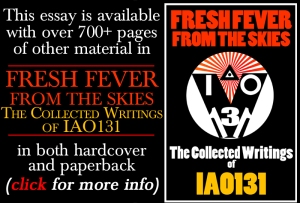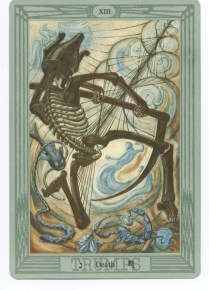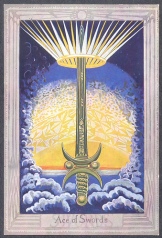One question that I have heard from friends and that I have often asked myself is, “Why Thelema?” Why not identify with any of the other religions or philosophies? I want to explain why I believe in the power of Thelema as a rule of life, and consequently why I believe that Thelema will continue to grow.
I. Do what thou wilt
The most fundamental point is that we have a certain Law under which everything else is subsumed: Do what thou wilt. It is the simple sublimity of this spiritual infrastructure that differentiates Thelema both from the various New Age religions (or “spiritualities”) that are characterized by the amorphous and cherrypicking nature of their beliefs as well as from the Old Aeon religions that are characterized by their rigid dogmatism and sectarianism. The Law of Liberty is so far-reaching that it has implications in all facets of life including metaphysics (as a philosophy), ethics (as a way of life), and theology (as a religion) yet it is so elegant that can be summed up in a single word, Thelema.
II. Tolerance
The fundamental Law of Thelema is “Do what thou wilt” which is a radical exhortation for each individual to explore and express their true nature, whatever that may be. Fundamentally, we as Thelemites uphold everyone’s right to be who they are. This involves a revolutionary form of tolerance or acceptance of diversity. Thelema itself is partially the result of a syncretism of many religions and philosophies. It says in The Book of the Law, “Aum! All words are sacred and all prophets true; save only that they understand a little.” We can also find reference to Jewish, Christian, Muslim, Egyptian, Greek, Hermetic, Buddhist, and Hindu ideas within The Book of the Law itself, let alone the other Holy Books and writings by Aleister Crowley. This speaks to Thelema’s ability to appreciate the truths that are held by the various ideologies across the globe and throughout history.
Our eclectic syncretism is not arbitrary though insofar as everything revolves around the core of “Do what thou wilt”: threads are gathered from all corners of human existence to be woven together through the harmony expressed in the word of the Law that is Thelema. The tolerant acceptance of different points-of-view is what distinguishes Thelema from virtually every other religion that has come about in human history. This can be seen very explicitly in the declaration of the rights of man in “Liber OZ,” wherein it is written, “Man has the right to live by his own law—to live in the way that he wills to do.”
We are radical in our acceptance of others as they are, however they may think, speak, or act, yet we also take up arms against dogmatism, prejudice, and superstition that impede the full expression of humanity’s liberty. This is encapsulated in a quotation where Crowley writes, “Every Star has its own Nature, which is ‘Right’ for it. We are not to be missionaries, with ideal standards of dress and morals, and such hard-ideas. We are to do what we will, and leave others to do what they will. We are infinitely tolerant, save of intolerance.”
III. Scientific Religion
Thelema is wholly against superstition and dogmatism that are so obviously a part of the various religions and philosophies of the past. We do not argue about how many angels can fit on the head of a pin, which color clothing generates bad karma on a certain day, how many times a mantra should be said to please a god, or what actions will be favorably judged by the Almighty Gaseous God-in-the-clouds.
This has implications in terms of action (morally) and thought (philosophically). Morally, we say, “Do what thou wilt shall be the whole of the Law”; this places the responsibility on the individual to find what is right for them without reference to any theological threats of the shame and guilt of sin, the eternal hellfire of damnation, an unfavorable response from a god, or even having a reincarnation in an insect. Philosophically, we do not assert anything that is blatantly contradictory to the knowledge-base of humanity, especially in terms of modern science. There are plenty of cases of people willfully denying the evidence of things as fundamental as evolution or germ theory. For example, it is not difficult to find instances in America of thinly-veiled theology being pushed in schools in the pseudo-scientific guise of “intelligent design.” Stories of people – even children – dying because their parents do not believe in medical care are not unheard of. In contrast, Thelema is a “scientific religion” that speaks to the vicissitudes of human experience that we often call “religion” or “spirituality” while remaining true to the progress of human knowledge that we often call “science.” A great article was recently written on how Aleister Crowley envisioned Thelema as a scientific religion that I recommend if you would like to know more about this particular aspect of the Law of Liberty.
Further, Thelema is a humanized religion: we place the goal of our aspiration within ourselves and we accept others for who they are. As I have written elsewhere: In the Aeon of Isis the focus was Nature, in the Aeon of Osiris the focus was God, and now in the Aeon of Horus the focus is Man, the individual. Our Goal is the fullest expression of ourselves in the True Will, our Path is towards the deepest totality of our selves, and our Community are neither in a “here-after” of Heaven nor gods or demi-gods in some plane “beyond” the world but rather the men and women here on Earth. This ideal is encapsulated in that powerful phrase, “There is no god but man.”
IV. Embracing the world while transcending materialism
Thelema embraces the world insofar as we do not believe sensual pleasures are evil or bad, and we do not believe that existence or incarnation or awareness is something to be annihilated or transcended or left behind. This attitude is encapsulated in The Book of the Law where it is written, “Be strong, o man! lust, enjoy all things of sense and rapture: fear not that any God shall deny thee for this.” As I have said elsewhere: The Earth is not a prison, but a Temple where the sacrament of Life may be enacted; the body is not corrupt, but a pulsing and thriving vessel for the expression of Energy; sex is not sinful, but a mysterious conduit of pleasure and power as well as an image of the ecstatic nature of all Experience.
While we embrace the world, we do not fall into the trap of petty materialism. This is seen in our distinguishing between want – our conscious desires, wishes, and whims that constantly come and go – and True Will. We embrace the world not to have more and bigger and shinier things but as an expression of our nature and a celebration of the joy of existence. This idea was treated in more depth in another recent essay, which can be read if you would like to know more about this particular subject.
V. Sexuality
In line with what was said before about tolerance and acceptance, Thelema specifically embraces all forms of sexual identity, orientation, exploration, and expression that is in line with the Will of the individual. Thelema is a way of life that very explicitly encourages people to be what they are sexually, not to live up to some standard whether dictated by religion or society. We do not view any particular gender identity or sexual orientation as more natural or as superior in any way. The best identity is the one that most clearly and fully is an expression of your nature. We see this encapsulated in The Book of the Law where it is written, “take your fill and will of love as ye will, when, where and with whom ye will!”
Crowley was very far ahead of his time in this way; for example, he wrote in the beginning of the 20th century, “The Beast 666 ordains by His authority that every man, and every woman, and every intermediately-sexed individual, shall be absolutely free to interpret and communicate Self by means of any sexual practices soever, whether direct or indirect, rational or symbolic, physiologically, legally, ethically, or religiously approved or no, provided only that all parties to any act are fully aware of all implications and responsibilities thereof, and heartily agree thereto.” We must remember that – as one very small example – it was more than half a century later before the American Psychological Association stopped labeling homosexuality as a form of mental illness. We as Thelemites take up the banner of acceptance of people as they are, no matter how they may choose to define and express themselves sexually.
VI. Drugs
Thelemites do not shy away from the use of alcohol and drugs based on philosophical, moral, or theological grounds. Thelema has no prohibitions against drugs (or anything, really) so long as what you are doing is in line with your Will. This requires people to take responsibility for their choices. I often think that it helps to say, “Do what thou wilt… and suffer the consequences” because saying “There is no law beyond Do what thou wilt” does not somehow absolve you of the consequences of your action; the Law of Thelema did not somehow abrogate the law of cause and effect. Abusing a substance will still lead to addiction, misusing a substance can still lead to mental imbalance, and rightly using a substance can lead to immense leaps in self-exploration and self-understanding. It is up to every individual to be informed about the use of drugs and to do them responsibly with an intent of finding, exploring, and expressing their true natures.
In a time where the use of psychedelics has only really been explored for their therapeutic potential in the past 5-10 years, this is also a radical approach to drugs. We have Crowley’s own addictions, the history of excess and abuse of drugs as can stereotypically be seen in the late 1960s, and possibly experiences of our own and those around us to warn us about the abuse of drugs. Conversely, we have Crowley’s own successes, a long history of the successful experimentation with drugs, as well as the experiences of our own and those around us to remind us of the distinct potential of using drugs in harmony with our Wills. Click here to read more about Thelema’s approach to drugs.
VII. Aleister Crowley
I believe that Aleister Crowley is exactly the prophet we need in this day and age for one fundamental reason: he was a human being. He was a genius, but he was a human being (despite his attempts to be remembered as a solar myth!). Crowley pushed the boundaries in virtually every category of life and so we may admire him in this way, but we also see things that challenge us. Crowley played with virtually every taboo he could find and in this way he challenges us to confront our own demons and find our own beliefs about how we should live. Our reaction to Crowley can be seen as a microcosm of our own reaction to taboos in general. This is a valuable task in which each individual can engage: what did Crowley do that particularly offends our sentiments? What things are “too far” or “too much,” and – more importantly – examine why it is that you believe he went too far. In this way, in studying our reaction to the prophet of Thelema we can learn more about our own blind spots, limits, and boundaries.
Crowley’s sometimes outrageous behavior also reminds us that we are not supposed to imitate Crowley in any way; we are supposed to find our own Way. That is what Thelema is about. Thelemites are united in a mutual respect and reverence for Crowley, and we are united in a mutual quest to find our Selves. We are not all trying to be Crowley like Christians try to be like Christ or Buddhists like Buddha; we are all trying to be who we really are and that is what sets us apart.
VIII. Rejoice!
 In a document that I believe every Thelemite should read for its clarity and incisiveness, Crowley wrote that one of our duties is to “Rejoice!” Thelema is a religion of joy and beauty. Humor is our armor and laughter our weapon. No longer do we look upon solemnity and self-effacement as synonymous with spirituality. Thelema is a law of Liberty that holds the keys to unlock the innate potential of every individual, to release ourselves from the burden of sorrow and fear, and to allow ourselves to be ourselves and rejoice therein. As it says in The Book of the Law, “Remember all ye that existence is pure joy.” With this knowledge, we can consciously and willfully engage in that ultimate Sacrament we know as existence. I therefore say with Crowley, “Look, brother, we are free! Rejoice with me, sister, there is no law beyond Do what thou wilt!”
In a document that I believe every Thelemite should read for its clarity and incisiveness, Crowley wrote that one of our duties is to “Rejoice!” Thelema is a religion of joy and beauty. Humor is our armor and laughter our weapon. No longer do we look upon solemnity and self-effacement as synonymous with spirituality. Thelema is a law of Liberty that holds the keys to unlock the innate potential of every individual, to release ourselves from the burden of sorrow and fear, and to allow ourselves to be ourselves and rejoice therein. As it says in The Book of the Law, “Remember all ye that existence is pure joy.” With this knowledge, we can consciously and willfully engage in that ultimate Sacrament we know as existence. I therefore say with Crowley, “Look, brother, we are free! Rejoice with me, sister, there is no law beyond Do what thou wilt!”

If you enjoy these writings, please consider pledging $1+ on my Patreon














 The “innocence” of the formula of the Child in Thelema is certainly not the uninformed, unexperienced innocence of actual children but refers to their point-of-view. Children are much less unimpeded by the imposed values from their family, friends, and society. Not only are their values less imposed but even their very basic way of understanding the world is unclouded by preformed opinions, systems, and maps. Instead, the “innocence” of a Child – which is, again, an ideal that all Thelemites can advantageously identify with – refers to its openness. The child is open to experience, as mentioned previously as one of the characteristics of the Child, and is open to new and different ways of perceiving ideas.
The “innocence” of the formula of the Child in Thelema is certainly not the uninformed, unexperienced innocence of actual children but refers to their point-of-view. Children are much less unimpeded by the imposed values from their family, friends, and society. Not only are their values less imposed but even their very basic way of understanding the world is unclouded by preformed opinions, systems, and maps. Instead, the “innocence” of a Child – which is, again, an ideal that all Thelemites can advantageously identify with – refers to its openness. The child is open to experience, as mentioned previously as one of the characteristics of the Child, and is open to new and different ways of perceiving ideas.